google cloud digital leader practice test
Google Cloud Digital Leader
Last exam update: Jul 20 ,2024
Question 1 Topic 3, General Google Cloud knowledge
Topic 3
Your organization needs to process large amounts of data from an online application that operates continuously. You do not
want to be required to provision infrastructure or create server clusters. What should your organization choose?
- A. Compute Engine with BigQuery
- B. Dataproc
- C. Google Kubernetes Engine with Cloud Bigtable
- D. Dataflow
Answer:
A
Question 2 Topic 3, General Google Cloud knowledge
Topic 3
Your organization wants to be sure that is expenditures on cloud services are in line with the budget. Which two Google
Cloud cost management features help your organization gain greater visibility into its cloud resource costs? (Choose two.)
- A. Billing dashboards
- B. Resource labels
- C. Sustained use discounts
- D. Financial governance policies
- E. Payments profile
Answer:
B D
Explanation:
Reference: https://cloud.google.com/cost-management#section-6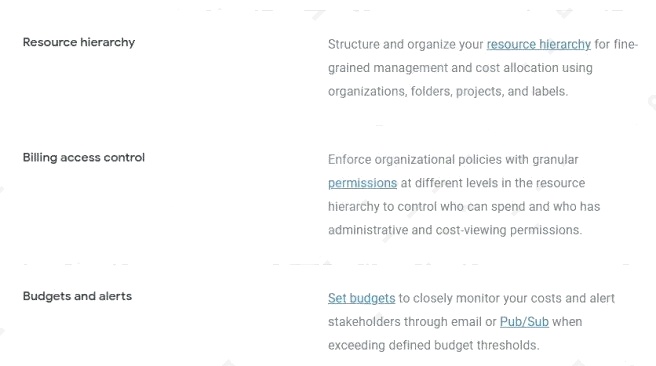
Question 3 Topic 3, General Google Cloud knowledge
Topic 3
Your company security team manages access control to production systems using an LDAP directory group.
How is this access control managed in the Google Cloud production project?
- A. Assign the proper role to the Service Account in the project’s IAM Policy
- B. Grant each user the roles/iam.serviceAccountUser role on a service account that exists in the Google Group.
- C. Assign the proper role to the Google Group in the project’s IAM Policy.
- D. Create the project in a folder with the same name as the LDAP directory group.
Answer:
C
Explanation:
Reference: https://cloud.google.com/blog/products/identity-security/achieving-identity-and-access-governance-on-google-
cloud
Question 4 Topic 3, General Google Cloud knowledge
Topic 3
Your organization wants to migrate your on-premises environment to Google Cloud. The on-premises environment consists
of containers and virtual machine instances. Which Google Cloud products can help to migrate the container images and the
virtual machine disks?
- A. Compute Engine and Filestore
- B. Artifact Registry and Cloud Storage
- C. Dataflow and BigQuery
- D. Pub/Sub and Cloud Storage
Answer:
A
Explanation:
Reference: https://cloud.google.com/compute/docs/import/importing-virtual-disks
Question 5 Topic 3, General Google Cloud knowledge
Topic 3
Your organization needs to minimize how much it pays for data traffic from the Google network to the internet. What should
your organization do?
- A. Choose the Standard network service tier.
- B. Choose the Premium network service tier.
- C. Deploy Cloud VPN.
- D. Deploy Cloud NAT.
Answer:
C
Explanation:
Reference: https://cloud.google.com/blog/products/networking/networking-cost-optimization-best-practices
Question 6 Topic 3, General Google Cloud knowledge
Topic 3
Your organization wants to optimize its use of Google Clouds discounts on virtual machine-based workloads. You plan to
use 200 CPUs constantly for the next 3 years, and you forecast that spikes of up to 300 CPUs will occur approximately 30%
of the time. What should you choose?
- A. 1-year committed use discount for 200 CPUs
- B. 3-year committed use discount for 300 CPUs
- C. 3-year committed use discount for 200 CPUs
- D. Regular pay-as-you-go pricing
Answer:
D
Explanation:
Reference: https://cloud.google.com/compute/all-pricing
Question 7 Topic 3, General Google Cloud knowledge
Topic 3
How should a multinational organization that is migrating to Google Cloud consider security and privacy regulations to
ensure that it is in compliance with global standards?
- A. Comply with data security and privacy regulations in each geographical region
- B. Comply with regional standards for data security and privacy, because they supersede all international regulations
- C. Comply with international standards for data security and privacy, because they supersede all regional regulations
- D. Comply with regional data security regulations, because they’re more complex than privacy standards
Answer:
C
Question 8 Topic 3, General Google Cloud knowledge
Topic 3
Your organization runs many workloads in different Google Cloud projects, each linked to the same billing account. Each
project's workload costs can vary from month to month, but the overall combined cost of all projects is relatively stable. Your
organization needs to optimize its cost.
What should your organization do?
- A. Purchase a commitment per project for each project’s usual minimum
- B. Create a billing account per project, and link each project to a different billing account
- C. Turn on committed use discount sharing, and create a commitment for the combined usage
- D. Move all workloads from all different projects into one single consolidated project
Answer:
B
Explanation:
Billing contacts
Reference: https://cloud.google.com/billing/docs/concepts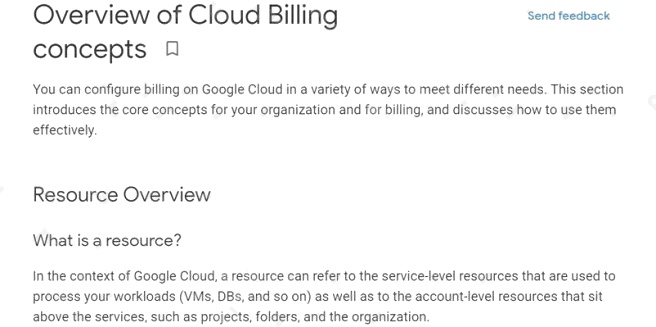
Question 9 Topic 3, General Google Cloud knowledge
Topic 3
Your organization is developing a plan for migrating to Google Cloud.
What is a best practice when initially configuring your Google Cloud environment?
- A. Create a project via Google Cloud Console per department in your company
- B. Define your resource hierarchy with an organization node on top
- C. Create projects based on team members’ requests
- D. Make every member of your company the project owner
Answer:
B
Question 10 Topic 3, General Google Cloud knowledge
Topic 3
Your organization runs an application on virtual machines in Google Cloud. This application processes incoming images.
This activity takes hours to create a result for each image. The workload for this application normally stays at a certain
baseline level, but at regular intervals it spikes to a much greater workload. Your organization needs to control the cost to run
this application.
What should your organization do?
- A. Purchase committed use discounts for the baseline load
- B. Purchase committed use discounts for the expected spike load
- C. Leverage sustained use discounts for your virtual machines
- D. Run the workload on preemptible VM instances
Answer:
C
Explanation:
The idea of the Sustained Use discount is that the longer you run a VM instance in any given month, the bigger discount you
will get from the list price.
Reference: https://www.parkmycloud.com/blog/google-sustained-use-discounts/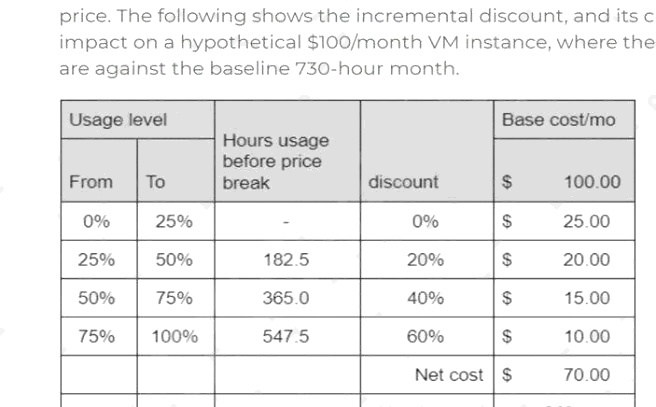
Question 11 Topic 3, General Google Cloud knowledge
Topic 3
Which Google Cloud service or feature lets you build machine learning models using Standard SQL and data in a data
warehouse?
- A. BigQuery ML
- B. TensorFlow
- C. AutoML Tables
- D. Cloud Bigtable ML
Answer:
A
Explanation:
BigQuery ML lets you create and execute machine learning models in BigQuery using standard SQL queries.
Reference: https://cloud.google.com/bigquery-
ml/docs/introduction#:~:text=BigQuery%20ML%20lets%20you%20create,the%20need%20to%20move%20data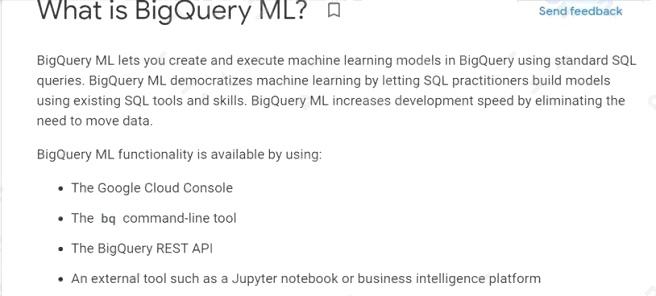
Question 12 Topic 3, General Google Cloud knowledge
Topic 3
Your organization offers public mobile apps and websites. You want to migrate to a Google Cloud-based solution for
checking and maintaining your users usernames and passwords and controlling their access to different resources based on
their identity.
Which should your organization choose?
- A. VPN tunnels
- B. Identity Platform
- C. Compute Engine firewall rules
- D. Private Google Access
Answer:
B
Explanation:
An identity platform is a modern solution for managing the identities of users and devices in a centralized fashion.
Reference: https://www.okta.com/blog/2021/07/what-is-an-identity-
platform/#:~:text=An%20identity%20platform%20is%20a,%2C%20integrations%2C%20and%20platform%20services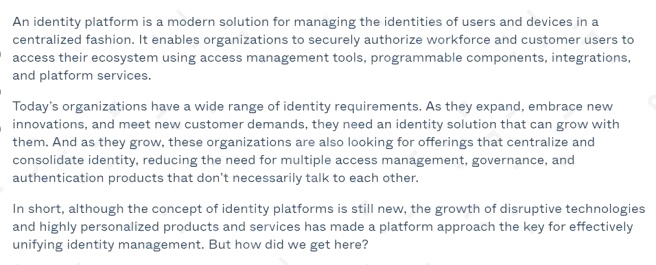
Question 13 Topic 3, General Google Cloud knowledge
Topic 3
Your organization is releasing its first publicly available application in Google Cloud. The application is critical to your
business and customers and requires a 2-hour SLA.
How should your organization set up support to minimize costs?
- A. Enroll in Premium Support
- B. Enroll in Enhanced Support
- C. Enroll in Standard Support
- D. Enroll in Basic Support
Answer:
B
Explanation:
Reference: https://www.secureauth.com/enhanced-support-offering/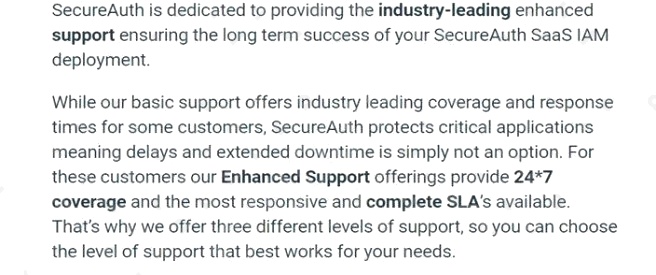
Question 14 Topic 3, General Google Cloud knowledge
Topic 3
Your organization is running all its workloads in a private cloud on top of a hypervisor. Your organization has decided it
wants to move to Google Cloud as quickly as possible. Your organization wants minimal changes to the current environment,
while using the maximum amount of managed services Google offers.
What should your organization do?
- A. Migrate the workloads to Google Cloud VMware Engine
- B. Migrate the workloads to Compute Engine
- C. Migrate the workloads to Bare Metal Solution
- D. Migrate the workloads to Google Kubernetes Engine
Answer:
B
Explanation:
Migrate for Compute Engine enables you to lift and shift workloads at scale to Google Cloud Compute Engine with minimal
changes and risk.
Reference: https://dataintegration.info/simplify-vm-migrations-with-migrate-for-compute-engine-as-a-service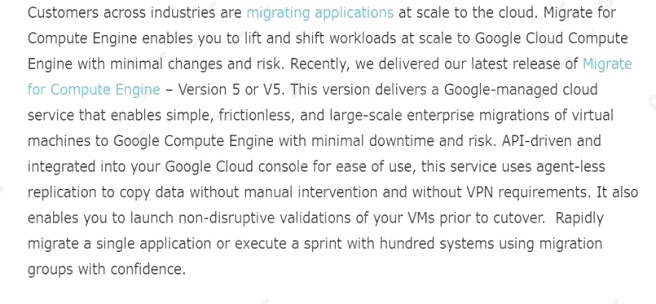
Question 15 Topic 3, General Google Cloud knowledge
Topic 3
Your company is running the majority of its workloads in a co-located data center. The workloads are running on virtual
machines (VMs) on top of a hypervisor and use either Linux or Windows server editions. As part of your companys
transformation strategy, you need to modernize workloads as much as possible by adopting cloud-native technologies. You
need to migrate the workloads into Google Cloud.
What should you do?
- A. Export the VMs into VMDK format, and import them into Compute Engine
- B. Export the VMs into VMDK format, and import them into Google Cloud VMware Engine
- C. Migrate the workloads using Migrate for Compute Engine
- D. Migrate the workloads using Migrate for Anthos
Answer:
D